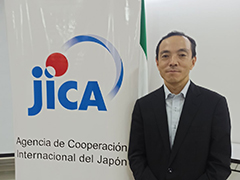The Plurinational State of Bolivia is located in the center of South America. It is a landlocked country surrounded by the countries of Peru, Brazil, Argentina, Paraguay and Chile.
The territory is 3 times larger than Japan and has a population of approximately 11.5 million. The country is a mountainous region with the Andes cordillera and a high plateau known as the Altiplano, above 4,000 m., with an exuberant ecosystem; the region of the valleys and the altiplano (approximately between 3,000 and 1,000 m) and the tropical region (under 1,000 m) with jungles and savannahs. In recent years, the country has become known in Japan for the Salar de Uyuni, also known as the miraculous Salar de Uyuni.

As for the ties between Japan and Bolivia, the presence of the Nikkei and Nikkei communities have played an important role. Since the first Japanese immigration to Bolivia in 1899, they have contributed to the economic development of Bolivia, particularly in agriculture. There are two Nikkei Colonies in the country: Colonia San Juan and Colonia Okinawa. Apart from the Colonies, there is the presence of the Nikkei throughout Bolivia and in 2022, the Japanese Society of La Paz is celebrating the 100th anniversary of its foundation.
The success of the Nikkei in the past has made the people of Bolivia trust Japan and the Japanese people, turning Bolivia into a pro-Japanese country.
In Bolivia, JICA began supporting Japanese migrants and descendants through a preceding Institution, the "Japanese Organization for Overseas Migration." Subsequently, with the signing of the Agreement for the Japanese Cooperation to send Volunteers overseas in 1977 and with the Technical Cooperation Agreement in 1978, JICA has carried out projects combining technical cooperation, financial cooperation and volunteer work in the sectors of agriculture, health, education, water, environment and infrastructure, focusing on the "people's capacity building".
In the agricultural sector, efforts have been made to promote aquaculture, livestock production and rice cultivation, as well as, in recent years, the promotion of market-oriented agriculture by small farmers (SHEP) and scientific and technical cooperation for the sustainable production of quinoa, a superfood, increasingly known and valued in Japan, within the framework of Science and Technology Research Partnership for Sustainable Development (SATREPS).
In the health sector, since the second half of the 1970s, the Government has worked to strengthen capacity in areas such as the diagnosis and treatment of gastrointestinal diseases. Currently, progress has been made and training is being carried out in neighboring countries with the third-country course. In addition, since the 2000s, efforts have been made to strengthen local health care focused on maternal and child health, which has contributed to reducing infant mortality rates.
As a result of these efforts and the stakeholder's trust, in 2022, under JICA's leadership, the Public-Private Partnership in Health Group (GAPPS for its acronym in Spanish) was officially created, with 17 institutions, mainly from the private sector.
In addition, there are approximately 5,000 Bolivians who have been trained in Japan and in third-country courses that, together with the Nikkei, we hope will act as a bridge for the new international cooperation between Japan and Bolivia, for the promotion of private businesses, as knowledgeable human resources that are friendly with Japan, according to JICA's vision: "Leading the world with trust". In Bolivia, JICA will continue to support the efforts of the Bolivian people, to carry out a dignified way of life, a diverse and just society, having trust as a connecting bond between Japan and Bolivia, and Latin America, to continue "Forging bonds of friendship and trust".
ITO Keisuke
Chief Representative, JICA Bolivia Office





scroll